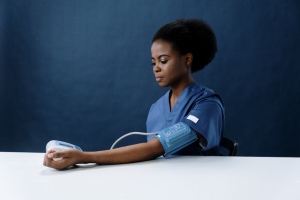Reduce Hypertension with Mindfulness
By John M. de Castro, Ph.D.
“High blood pressure is a silent killer. It can strike without warning, but with proper care and lifestyle changes, it can be controlled.” – Dr. David B. Ryder
High Blood Pressure (Hypertension) is an insidious disease because there are no overt symptoms. The individual feels fine. But it can be deadly as more than 360,000 American deaths, roughly 1,000 deaths each day, had high blood pressure as a primary or contributing cause. In addition, hypertension markedly increases the risk heart attack, stroke, heart failure, and kidney disease. It is also a very common disorder with about 70 million American adults (29%) having high blood pressure and only about half (52%) of people with high blood pressure have their condition under control. Treatment frequently includes antihypertensive drugs. But these medications often have adverse side effects. So, patients feel lousy when taking the drugs, but fine when they’re not. So, compliance is a major issue with many patients not taking the drugs regularly or stopping entirely. Obviously, there is a need for alternative to drug treatments for hypertension. Mindfulness practices have been shown to aid in controlling hypertension.
In today’s Research News article “Effect of Adapted Mindfulness Training in Participants With Elevated Office Blood Pressure: The MB-BP Study: A Randomized Clinical Trial” (See summary below or view the full text of the study at: https://www.ncbi.nlm.nih.gov/pmc/articles/PMC10381983/ ) Loucks and colleagues recruited adults with elevated blood pressure and randomly assigned them to either enhanced usual care or to receive Mindfulness-Based Blood Pressure Reduction, based upon Mindfulness-Based Stress Reduction (MBSR) program, consisting of 8 weekly 2,5 hour group sessions along with home mindfulness practice. The participants were measured at baseline and at 3 and 6 months later for blood pressure, health behaviors, physical activity, diet, alcohol consumption, antihypertensive medication, perceived stress, and mindfulness.
They found that mindfulness training produced a significantly greater reduction in blood pressure at 3 and 6 months. They also found significant reductions in sedentary activity and perceived stress and a significant increase in mindfulness.
Hence, mindfulness training was found to be an effective treatment for hypertension.
“The secret to managing blood pressure is a healthy lifestyle”– Dr. Andrew Hall
CMCS – Center for Mindfulness and Contemplative Studies
This and other Contemplative Studies posts are also available on the Contemplative Studies Blog http://contemplative-studies.org
Study Summary
Loucks EB, Schuman-Olivier Z, Saadeh FB, Scarpaci MM, Nardi WR, Proulx JA, Gutman R, King J, Britton WB, Kronish IM. Effect of Adapted Mindfulness Training in Participants With Elevated Office Blood Pressure: The MB-BP Study: A Randomized Clinical Trial. J Am Heart Assoc. 2023 Jun 6;12(11):e028712. doi: 10.1161/JAHA.122.028712. Epub 2023 May 23. PMID: 37218591; PMCID: PMC10381983.
Clinical Perspective
What Is New?
This study represents the first randomized controlled trial of a mindfulness‐based program that has been customized to participants with elevated blood pressure.
What Are the Clinical Implications?
This study demonstrated a clinically significant reduction in systolic blood pressure, with evidence of effects on sedentary activity, Dietary Approaches to Stop Hypertension dietary pattern, and mindfulness.
This program may offer an appealing approach to help control blood pressure of the 46% of Americans with hypertension, of which >75% is uncontrolled.
Abstract
Background
Hypertension is a leading risk factor for cardiovascular disease. Despite availability of effective lifestyle and medication treatments, blood pressure (BP) is poorly controlled in the United States. Mindfulness training may offer a novel approach to improve BP control. The objective was to evaluate the effects of Mindfulness‐Based Blood Pressure Reduction (MB‐BP) versus enhanced usual care control on unattended office systolic BP.
Methods and Results
Methods included a parallel‐group phase 2 randomized clinical trial conducted from June 2017 to November 2020. Follow‐up time was 6 months. Outcome assessors and data analyst were blinded to group allocation. Participants had elevated unattended office BP (≥120/80 mm Hg). We randomized 201 participants to MB‐BP (n=101) or enhanced usual care control (n=100). MB‐BP is a mindfulness‐based program adapted for elevated BP. Loss‐to‐follow‐up was 17.4%. The primary outcome was change in unattended office systolic BP at 6 months. A total of 201 participants (58.7% women; 81.1% non‐Hispanic White race and ethnicity; mean age, 59.5 years) were randomized. Results showed that MB‐BP was associated with a 5.9‐mm Hg reduction (95% CI, −9.1 to −2.8 mm Hg) in systolic BP from baseline and outperformed the control group by 4.5 mm Hg at 6 months (95% CI, −9.0 to −0.1 mm Hg) in prespecified analyses. Plausible mechanisms with evidence to be impacted by MB‐BP versus control were sedentary activity (−350.8 sitting min/wk [95% CI, −636.5 to −65.1] sitting min/wk), Dietary Approaches to Stop Hypertension diet (0.32 score [95% CI, −0.04 to 0.67]), and mindfulness (7.3 score [95% CI, 3.0–11.6]).
Conclusions
A mindfulness‐based program adapted for individuals with elevated BP showed clinically relevant reductions in systolic BP compared with enhanced usual care. Mindfulness training may be a useful approach to improve BP.
